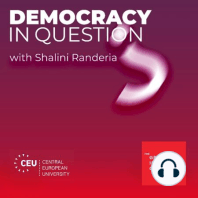2 min listen

Ken Opalo on the Prospects of Democracy in Africa
Ken Opalo on the Prospects of Democracy in Africa
ratings:
Length:
40 minutes
Released:
Mar 1, 2023
Format:
Podcast episode
Description
Democracy in Question? is brought to you by:• Central European University: CEU• The Albert Hirschman Centre on Democracy in Geneva: AHCD• The Podcast Company: Novel Follow us on social media!• Central European University: @CEU• Albert Hirschman Centre on Democracy in Geneva: @AHDCentreSubscribe to the show. If you enjoyed what you listened to, you can support us by leaving a review and sharing our podcast in your networks! DiQ S6 EP4Ken Opalo on the Prospects of Democracy in AfricaGlossaryWhat is the African Union?(31:02 or p.8 in the transcript)African Union (AU), formerly (1963–2002) Organization of African Unity, is an intergovernmental organization, established in 2002, to promote unity and solidarity of African states, to spur economic development, and to promote international cooperation. The African Union (AU) replaced the Organization of African Unity (OAU). The AU’s headquarters are in Addis Ababa, Ethiopia. The OAU was established on May 25, 1963, and its activities included diplomacy (especially in support of African liberation movements), mediation of boundary conflicts and regional and civil wars, and research in economics and communications. The OAU maintained the “Africa group” at the United Nations (UN) through which many of its efforts at international coordination were channeled. The OAU was instrumental in bringing about the joint cooperation of African states in the work of the Group of 77, which acts as a caucus of developing nations within the UN Conference on Trade and Development. The principal organ of the OAU was the annual assembly of heads of state and government. In 2000, in a move spearheaded by Libyan leader Colonel Muammar al-Qaddafi, it was proposed that the OAU be replaced by a new body, the African Union. The African Union was to be more economic in nature, similar to the European Union, and would contain a central bank, a court of justice, and an all-Africa parliament. A Constitutive Act, which provided for the establishment of the African Union, was ratified by two-thirds of the OAU’s members and came into force on May 26, 2001. After a transition period, the African Union replaced the OAU in July 2002. In 2004 the AU’s Pan-African Parliament was inaugurated, and the organization agreed to create a peacekeeping force, the African Standby Force, of about 15,000 soldiers. sourceWhat is the Sahel Crisis?(33:18 or p.9 in the transcript)The central Sahel region, which includes the countries of Burkina Faso, Mali and Niger, is facing one of the fastest growing displacement crises in the world. More than 2.7 million people have been forced to flee their homes and at least 13.4 million are in dire need of humanitarian assistance. People began fleeing the central Sahel region in 2011 after an outbreak of violence in Northern Mali. Poverty, unemployment, and the presence of armed groups in rural areas of Northern Mali all contributed to an increase in forced displacement. Armed groups have rapidly expanded, spreading violence to central parts of the country and to neighboring countries, such as Burkina Faso and Niger. As a result of the conflict, millions of families have been displaced across the region, including 650,000 people uprooted in 2019 alone. Approximately 1.8 million people have been internally displaced. In Burkina Faso, at least 1 million people – approximately 5 percent of the country’s population- have fled violence inside the country in the past year, many seeking refuge in areas that are also affected by violence and poverty. Armed conflict, economic insecurity, and the adverse effects of climate change are some of the biggest challenges affecting the region. Indiscriminate attacks against civilians and public infrastructure – including schools and health facilities – have threatened the lives of millions of people and their livelihoods. The conflict has claimed more than 6,500 lives in the last year and threatens to leave at least 7.4 million people suffering from acute malnutriti
Released:
Mar 1, 2023
Format:
Podcast episode
Titles in the series (77)
Introducing Democracy in Question: Liberal democracies are under unprecedented strain from within and without. Join renowned social anthropologist Shalini Randeria and leading scholars for an exploration of the challenges democracies are facing around the world. Subscribe now! by Democracy in Question?